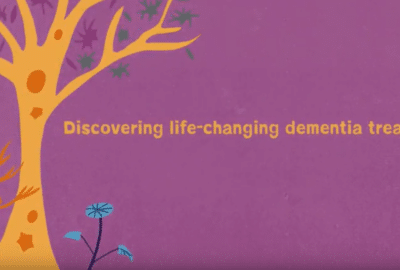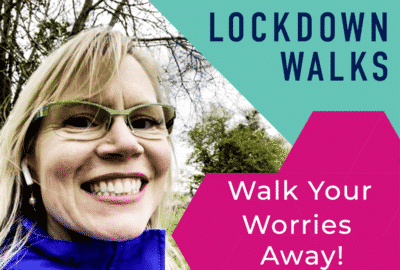Coping with voices: Being with people
Thursday 29th Oct 2020, 10.30am
Hearing voices can come in many forms – some voices are friendly, helpful, insightful and inspiring whilst others are scary, critical or commanding. This animation, produced in collaboration with the Department of Psychiatry at the University of Oxford and the McPin Hearing Voices Lived Experience Advisory Panel, shares the stories of people who hear one type of voices: those which threaten them or criticise them. Our hope is that this animation inspires more conversations about voices, because nobody should be hearing nasty voices alone.
This animation is funded by the University of Oxford’s Public Engagement with Research Seed Fund, a National Institute for Health Research (NIHR) Clinical Doctoral Research Fellowship (ICA-CDRF-2017-03-088) awarded to Bryony Sheaves, and the NIHR Oxford Health Biomedical Research Centre. The animation presents results from independent research funded by the National Institute for Health Research (NIHR). The views expressed are those of the authors and not necessarily those of the NHS, the NIHR or the Department of Health and Social Care.
What is ‘voice hearing’?
Hearing voices can come in many forms. Some people hear voices that are friendly, helpful, insightful or inspiring. Indeed, these kinds of voices can be very enriching experiences. However, others hear voices that are scary, critical or commanding. These can have very disruptive effects on day-to-day life. Whilst voices differ substantially, what unites all voice hearing experiences is that they are rarely talked about.
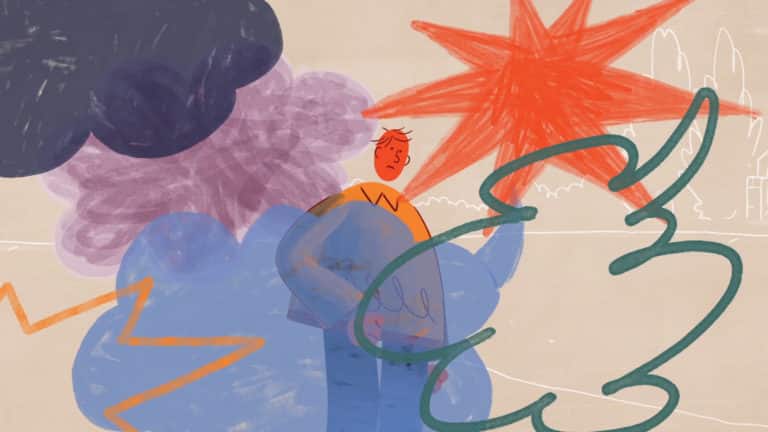
Hearing voices can be confusing and exhausting.
Our animation shares the stories of people who hear one type of voices: those which threaten them or criticise them. These are the kinds of things they hear:
(Please note that pseudonyms have been used to maintain the anonymity of participants.)
“[the voices tell me] everybody else hates you and they don’t need you [..] just that you are, you know, just a complete disappointment” (‘Anna’).
“The voices had me believing that I wouldn’t be waking up in the morning. And um they said they were going to skin me um, [..] all this horrible stuff” (‘Dave’).
Critical and threatening voices are one of the most common types of voices for people who are in touch with mental health services. They can seem incredibly real: “[they] were as audible as you are now” (‘Liam’) and are often described as being very believable and difficult to ignore (Sheaves et al., 2020). Understandably they have a powerful impact on the individual, for example one person that we interviewed explained: “it’s a scary, scary, scary, scary situation, I’ve had more fear in the last two years than anywhere in my life” (‘Bill’).
What unites the voice hearing experience is that they are very rarely talked about.
A feeling of isolation
Because voices are rarely talked about, people who hear the nasty ones are often suffering in silence. We all need social support to help us through difficult times, yet many people who hear nasty voices describe feeling lonely and isolated. Being isolated is difficult in itself, but can also affect the voices. For example research shows that those who are isolated are more likely to experience more troublesome voices later down the line (Norman et al., 2005; Salokangas, 1997), and are more likely to require a stay in hospital (Norman et al., 2005).
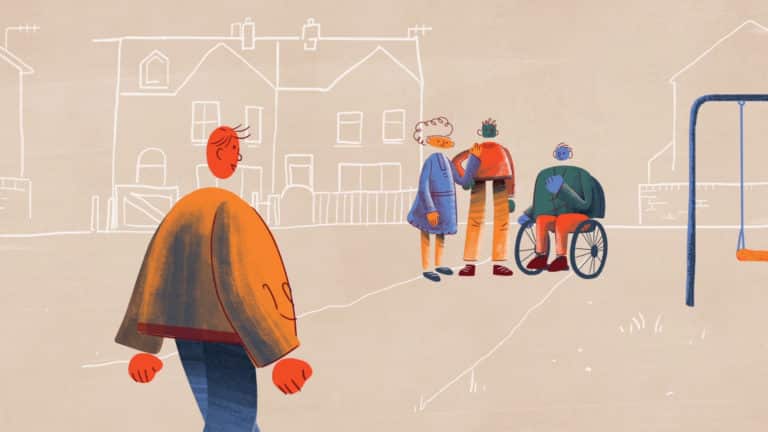
Many people who hear nasty voices describe feeling lonely and isolated.
We all need social support to help us through difficult times, yet many people who hear nasty voices describe feeling lonely and isolated.
Reasons why being around people is difficult whilst hearing nasty voices
To help us understand what it is like to be affected by hearing nasty voices whilst trying to connect with people we interviewed 15 people who hear nasty voices. We then analysed the interviews in detail to look for themes across the interviews.
The research showed that there were ten key reasons why being around people is difficult whilst hearing voices. These are shared below, with quotes from the participants themselves.
| Theme | Participant Quote | |
|---|---|---|
| 1 | The comments from the voices reduce my trust in other people | “the voices are telling me people are going to hurt me [..] I can’t really walk past people” (‘Craig’) |
| 2 | If I talk to people about the voices, it will hurt or upset them | “I would rather it just scared me than scared anybody else” (‘Kerry’) |
| 3 | People don’t understand what I’m going through | “I am not being rude and not listening to them it’s just like I’m petrified listening to something else [..]. They don’t understand that do they?” (‘Dan’) |
| 4 | We don’t share the same reality | “I’m living two different lives at once, I have this kind of strange world in my mind and then I have the kind of physical reality of this world.” (‘Peter’). |
| 5 | I fear stigma or negative judgement from others | “I haven’t told anyone [..], even [my] best friend I would never tell them in this much detail. [..] it sounds mad isn’t it, which it is” (‘Liam’) |
| 6 | I might respond to the voices when around other people | “there are times I have to shout back to the voices and it does make things depressing for him” (‘India’) |
| 7 | The voices are listening to my conversation and there may be consequences from what I say | “because I know I’m going to get a backlash [from the voices]. [..] I’m not allowed to tell people, that’s been drummed into me since I was a kid” (‘Kerry’) |
| 8 | It’s confusing, working out who is speaking | “sometimes [..] I hear my name um being called [..] but sometimes somebody is actually calling me and it’s like am I thinking or hearing it?” (‘Dan’) |
| 9 | The concentration required is hard or tiring | “when people are talking to me I might find it hard to concentrate on them if I am hearing things” (‘Dan’) |
| 10 | Being around people can make nasty voices worse | “I don’t like talking to my mum about [the voices] because she gets upset [..], that makes me start getting upset and then the voices just get worse” (‘Craig’) |
The relationship between being around people and hearing nasty voices
Several participants described an instinct to disconnect from people after the voices started, and when they were particularly bad. This instinct to withdraw came in different forms, including:
1. Isolating oneself from people: “You know you withdraw, you don’t want to talk to people” (‘Liam’).
2. Turning away offered support: “friends would come to see me [..] I was just turning them away” (‘Dan’).
3. Difficulty talking to other people: “I would go and see my family, but I wouldn’t say anything to them really” (‘Nick’).
4. Difficulty sharing the experience of hearing voices: “six months I waited before I told my mum and dad. I had already gone to the doctors at that point [..] I was just so frightened to tell anybody.” (‘Anna’).
One person who had heard voices for 15 years had not spoken to any family or friends about hearing them.
However isolation wasn’t a long term solution. And many participants described that being alone was a time when voices were often worse. For example: “I tend to hear them when I’m on my, mostly on my own sort of thing.” (‘Dave’).
Several participants commented that talking to people helped with the voices, for example:
“the best thing I ever did was talked about it but then the worst thing I did was when I was 16 I didn’t tell anyone. And then I ended up like having a complete breakdown” (‘Dan’)
Talking to people helped with the voices in four specific ways:
1.It helped some people to question whether or not the voices are telling the truth: “[the voices] are telling me a red van is going to [..]pull me in and drive me off [..] if I voice it and then my mate can be like it’s just your voices babe, like look around there’s no red van” (‘Kerry’).
2. It helped others to work out whether the voices were real or not: “I tell friends about it and they say I don’t hear anything you know there’s nothing there” (‘Nick’).
3. It moved the nasty voices into the background of attention: “I’m focused on the person [..] without even thinking about it I’m just not hearing the voices as much” (‘Tom’).
4. And for some people it reduced the frequency with which the voices came: “tends to help them not, not to occur in the first place” (‘Nick’).
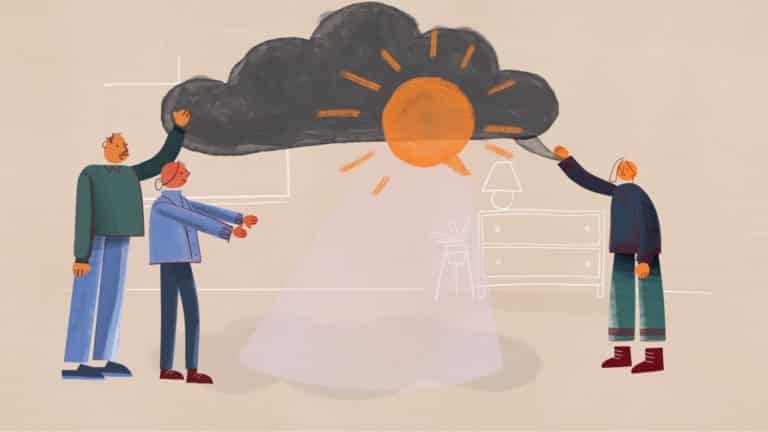
Several participants commented that talking to people helped with the voices.
Things which enable people who hear nasty voices to reconnect with people
Several people we spoke to in the research were still feeling very isolated. But some had learnt a means of reconnecting and shared things which helped them to reconnect with people. These were:
| Theme | Participant Quote | |
|---|---|---|
| 1 | Learning to rebuild trust | “when you don’t trust anybody there’s nothing that a stranger could help you with initially until you have built up trust and built up a relationship.” (‘Liam’). |
| 2 | Connecting with other people that hear voices | “Friends and family, they are emotionally affected by your depressive stuff, and I think in the Hearing Voices group people tend to believe you which people may not get from elsewhere.” (‘India’) |
| 3 | Explaining the problem to people who do not hear nasty voices | “the only time you ever hear anything about somebody with schizo anything is when something really bad happens. So, if I tell people, people are going to think that I’m going to do that or I’m going to do this. Whereas actually the more I talk about it now the more people are like, to be fair I would never have noticed [..] And that [..] makes me open up more” (‘Kerry’). |
| 4 | If people are judgemental then you can choose to distance yourself from them | “I think in more recent years [..] I have kind of thought [..] if people don’t like it that’s their problem, not mine. If people are there and love you and accept it then they love you and accept you as well. So, [..] they have got an issue with it then they are not worth your time” (‘Anna’). |
| 5 | Self-acceptance | “Whereas now I am quite open with it, I just think [..] It is not me but it’s a part of me and why should I be ashamed of it? (‘Kerry’) |
| 6 | Knowing that some days it’s OK to stay at home | “I’m in an open wide space and I’m not used, [..] to it [..] when I get like that I am used to being in my room where I, I feel safe and I can question it.” (‘Craig’) |
| 7 | Other people persevering in their efforts to provide support | “I think they have a hard job doing it because when I believe it it’s hard to tell me otherwise. But [..] if they carry on for long enough I will calm” (‘Kerry’) |
| 8 | Shifting attention from the voices to the other person | “I like to think I have learned how to communicate better um and make sure instead of being so inward sort of focus on the other person.” (‘Dan’) |
Social support is crucial for facing any challenges that we can experience in life. Yet clearly hearing nasty voices poses many barriers to being around people. Our hope is that this animation inspires more conversations about voices, because nobody should be hearing nasty voices alone.
Publications
References
Norman, R. M. G., Malla, A. K., Manchanda, R., Harricharan, R., Takhar, J., & Northcott, S. (2005). Social support and three-year symptom and admission outcomes for first episode psychosis. Schizophrenia Research, 80(2–3), 227–234. https://doi.org/10.1016/j.schres.2005.05.006
Salokangas, R. K. R. (1997). Living situation, social network and outcome in schizophrenia: A five- year prospective follow-up study. Acta Psychiatrica Scandinavica, 96(6), 459–468. https://doi.org/10.1111/j.1600-0447.1997.tb09948.x
Sheaves, B., Johns, L., Griffith, L., Isham, L., Kabir, T., & Freeman, D. (2020). Why do patients with psychosis listen to and believe derogatory and threatening voices? 21 reasons given by patients. Behavioural and Cognitive Psychotherapy, epub ahead, 1–15. https://doi.org/10.1017/S1352465820000429



